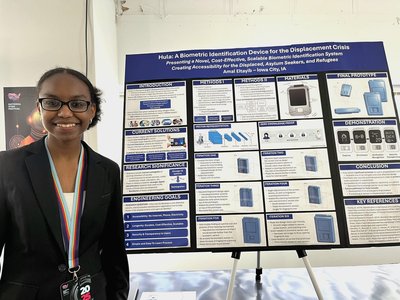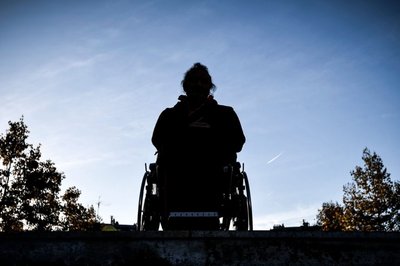Cover photo: Amal (Iowa) and her project, Hula: A Biometric Identification Device for the Displacement Crisis
This year's EXPLR National STEM Festival in Washington, D.C. brought together students, educators and STEM professionals from all over the country to participate in mentor sessions, networking and hands-on STEM activities.
The event also featured over 100 STEM students from 48 states competing to create projects that solve real-world problems like reducing medical waste with eco-friendly, seaweed bandaids and an app that helps schools reduce their carbon footprints. News Hour Classroom attended the festival and captured photos of young innovators and their projects, which you can see below.
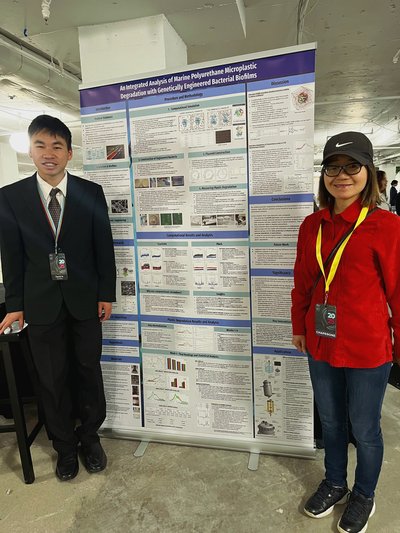
David (California) and his project, "An Integrated Analysis of Marine Polyurethane Microplastic Degradation with Genetically Engineered Bacterial Biofilms"
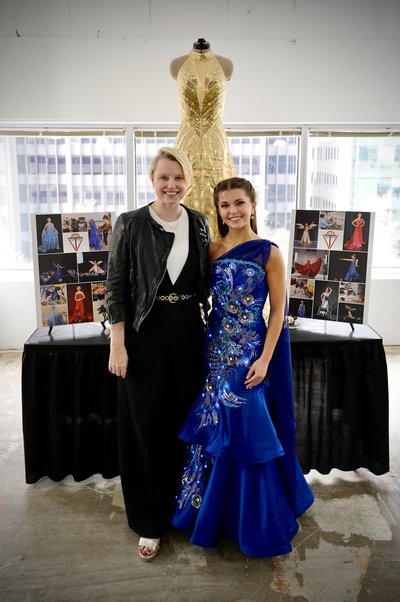
Sara (Alaska) and her project, "Vintage Train Case Designs, STEM-Infused Wearable Art"
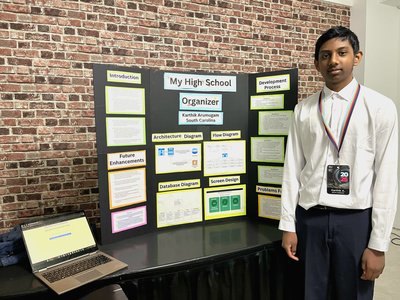
Karthik (South Carolina) and his project, "My High School Organizer"
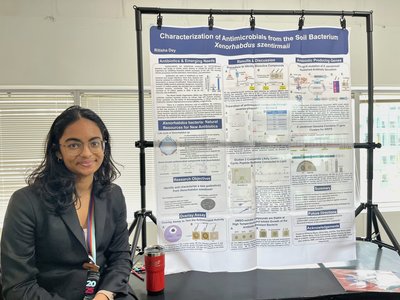
Ritisha (Wisconsin) and her project, "Characterization of Antimicrobials from the Soil Bacterium Xenorhabdus szentirmaii"
Editor's note: The following projects are from the 2024 EXPLR National STEM Festival, which took place on April 12-13 in Washington, D.C.
Question: Tell us about your experience with your STEM project. What did you learn? Was it difficult? Was it fun?
Aarna Puvvala, Nashua, N.H. (Age: 15):
While creating my STEM project, I learned a lot about how people think about being environmentally friendly. Trying to make a difference in the world can feel extremely overwhelming, and sometimes, trying to do something feels useless. People think they have to make a huge change, such as not using cars, but even something as simple as buying local groceries can reduce an individual's carbon emissions by 4-5%.
This is why my project is about an app that can track the difference that an individual is making so that they can see that every little action matters. It was fun because it was a good learning experience, and I learned a lot about how even small actions impact the environment, not just coal mines or jet engines that cause pollution.
Rhea Doshi, Farmington, Conn. (Age: 14):
This was an extremely challenging and fun project. Seeing a lot of plastic pollution in the ocean and hearing my neurologist mom talk about microplastics in the human body and their potential harm was an eye-opener. Additionally, clean drinking water remains a challenge globally, and now we have to worry about one more pollutant.
I wanted to come up with a cost-effective way to filter the water and have it used by everyone. I also learned that we currently do not treat our water to remove microplastics and are not measuring it.
While attention is given to PFAS, we can solve the challenge of PFAS and microplastics in the water using my contraption. One of the biggest challenges was measuring the amount of microplastics in the water, as there was no set standard, and much of my time was spent on effective measurement. It was challenging, and that is what made it fun.
Question: Do you have an interesting/funny story about yourself, or participating in this challenge? It could be about your love for STEM, your career goals, or anything you think people may want to know!
Rhea Doshi, Farmington, Conn. (Age: 14):
In tackling this challenge, I also started learning about CRISPR and GENE EDITING. As I told my parents, I could use some gene-editing microbes to eat the microplastics. This suggestion of modified microbes scares my parents a lot!! But I am excited about the possibilities.
In participating in these science fairs, I know one thing: I would like to be in the biomedical sciences and human behavior field. I love everything about it and can spend hours upon hours on it. I have seen and met some knowledgeable girls in the field of STEM and am truly encouraged to see them thrive.
I told a six-year-old girl at one of the fairs that I was her number one fan based on her project, as I was genuinely impressed by her invention and couldn't wait to see her grow!
Question: How does it feel for your entry to be recognized in a National STEM Challenge?
Megan Yeager, Gambrills, MD (Age: 16):
My research being recognized at a national competition demonstrates the importance of supporting STEM and research conducted by a younger generation. STEM plays a crucial role in addressing the world's most pressing challenges.
When student research is recognized at the national level, it inspires others to pursue their passions in STEM. Recognizing my entry in the National STEM Challenge motivates and inspires my love for STEM.
ADDITIONAL RESOURCES
Be sure to check out PBS News Hour Classroom's Invention Education collection full of lessons and video stories featuring student inventors and their teachers.
Invention is just one more problem-solving approach in which young people can solve challenges locally or around the world. We also have a fun, uplifting Invention Educator Network (no experience necessary!), which brings together teachers from various subjects and grade levels to discuss all things invention & innovation. Sign up here to learn more.
On March 26, 2025, at 7-8 pm ET, News Hour Classroom will be co-hosting a live Educator Chat with the Jacobson Institute, an entrepreneurial education center. Students are also welcome to join! Click here to RSVP.
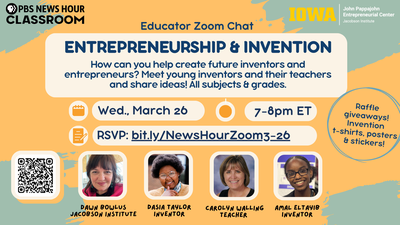
By News Hour's Victoria Pasquantonio and Gianfranco Beran, production assistant.
Fill out this form to share your thoughts on Classroom’s resources. Sign up for News Hour Classroom’s ready-to-go Daily News Lessons delivered to your inbox each week.
